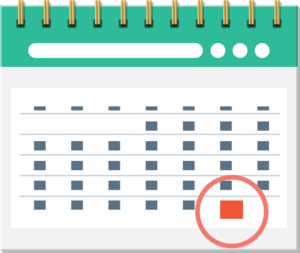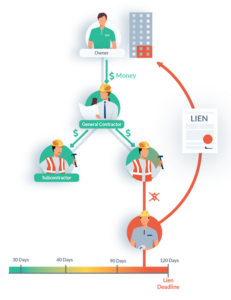
A Georgia Notice of Commencement is an invaluable tool for owners and property developers alike. There is always risk associated with every construction project, and property owners are the ones who are bearing the most. Besides ensuring that the project is successfully completed, one of the biggest risk facing owners if the possibility of a mechancis lien being filed on the property.
Any subcontractor or supplier can file a mechanics lien if they provided labor or materials to your project, and were unpaid. Even if you’ve already paid your general contractor, an owner can be forced to pay off the claim to have the lien removed from their property. Which means paying twice, for the same work.
This guide and checklist is meant for property owners to better understand how to properly maximize the protections afforded by a Georgia Notice of Commencement and the lien waiver process to avoid any expensive claims that could arise on a Georgia construction project.
1. Research your general contractor
Before getting started on any project, you’ll need to choose a general contractor. Choosing the right general contractor is an incredibly important decision. When it comes down to it, there are two things that a property owner should consider before hiring.
The first is the more obvious, and that’s determining whether the GC will do a good job or not. This can take a bit of research. You need to be sure that they will do a quality job and that the project will be delivered on time and on budget (or under if possible!). A good place to start your research is to consult review websites such as Angie’s List to see reviews from other owners.
The second consideration is whether the GC has a history of any payment or cashflow problems. Researching this can prove to be more challenging. This information is probably the most important. One way to begin this research is to look up your contractor’s Levelset profile to see their payment behavior, any liens filed on their projects, or any other red flags that may affect your project.
2. Filing a Georgia Notice of Commencement
After you’ve done your due diligence, and collected all of the available information on a general contractor, it’s time to file a Georgia Notice of Commencement. Filing this notice correctly and on time is extremely important to you as an owner. That’s because it is one of the few days you can protect your property from any “surprise liens” filed on the property.
What are the Georgia Notice of Commencement requirements?
The state of Georgia requires a Notice of Commencement to be filed on every project within the state. Failure to file this notice will make certain preliminary notice (notice to contractor) requirements inapplicable. This can be filed either by the property owner themselves, an owner’s agent, or the general contractor. It doesn’t matter which of these parties file it, as long as it’s filed. Additionally, after the notice is filed in the proper county office, it must also be posted on the project site itself. Failure to do so will automatically make the notice invalid.
How does the Georgia Notice of Commencement help property owners
The Georgia Notice of Commencement is a crucial step to protect property owners from the risk of a mechanics lien filed on the property. For more information on, you can head over to our Georgia Mechanics Lien FAQs & Resources page.
Owners need to be extremely careful when it comes to distributing funds on a construction project. If anyone goes unpaid, an owner will be ultimately responsible for settling the debt, which could potentially result in paying twice for the same work.
The most significant benefit of filing a Notice of Commencement is that you eliminate the risk of paying twice for the same work. Without a notice filed, there is no requirement for subs and suppliers to notify you that they are working on your property. Filing this notice grants you as a property owner, the ability to identify any potential lien claimants. Which, in turn, can help spot payment problems early and makes the lien waiver collection process easier.
What must be included on a Notice of Commencement form in Georgia?
The Notice of Commencement in Georgia is regulated by O.C.G.A. §44-14-361.5. The statute sets out what information must be included in the notice in order to be valid. This includes all of the following:
- Contractor’s name, address, and telephone number
- Name and location of the project, along with a full legal property description;
- To help get you started, download our free Legal Property Cheat Sheet
- True owner’s name and address;
- Any person, if someone other than the owner, who ordered or requested the improvements name and address;
- Surety of the performance bond or payment bond’s name and address (if any); &
- Construction lender’s name and address (if any).
All of this information is necessary in order to be considered a valid notice. Georgia courts have identified some information that is absolutely vital to get right; specifically the true owner’s information, the legal description of the property, and the construction lender’s information. Any errors filling out that information will be fatal to your notice.
Designating a specific recipient
Many states grant the ability to appoint a third-party to act as an agent for all notices and manage the payment process. These are known as “owner-designees.” This practice doesn’t quite exist in Georgia, but there is a way to streamline this process.
A great tip which comes from Cobb Law Group’s “3 Big Tips for Using a Georgia Notice of Commencement to Your Advantage” is to include a specific recipient at the owner’s office. By assigning a specific addressee for all notices, owners can rest assured that all notices are properly collected and accounted for and that lien waivers are collected from everyone on the project.
When to file a Georgia Notice of Commencement?

Where to file a Georgia Notice of Commencement?
A Notice of Commencement in Georgia must be filed with the clerk of the superior court in the county where the property is located. Georgia has a lot of counties, and figuring out which county office to file your Notice of Commencement can be difficult. To make things easier, we’ve put together a list of links to the county clerk websites for the specific office where they can be filed.
- Appling County Lien Filing (Recorder’s Site)
- Atkinson County Lien Filing (Recorder’s Site)
- Bacon County Lien Filing (Recorder’s Site)
- Baker County Lien Filing (Recorder’s Site)
- Baldwin County Lien Filing (Recorder’s Site)
- Banks County Lien Filing (Recorder’s Site)
- Barrow County Lien Filing (Recorder’s Site)
- Bartow County Lien Filing (Recorder’s Site)
- Ben Hill County Lien Filing (Recorder’s Site)
- Berrien County Lien Filing (Recorder’s Site)
- Bibb County Lien Filing (Recorder’s Site)
- Bleckley County Lien Filing (Recorder’s Site)
- Brantley County Lien Filing (Recorder’s Site)
- Brooks County Lien Filing (Recorder’s Site)
- Bryan County Lien Filing (Recorder’s Site)
- Bulloch County Lien Filing (Recorder’s Site)
- Burke County Lien Filing (Recorder’s Site)
- Butts County Lien Filing (Recorder’s Site)
- Calhoun County Lien Filing (Recorder’s Site)
- Camden County Lien Filing (Recorder’s Site)
- Candler County Lien Filing (Recorder’s Site)
- Carroll County Lien Filing (Recorder’s Site)
- Catoosa County Lien Filing (Recorder’s Site)
- Charlton County Lien Filing (Recorder’s Site)
- Chatham County Lien Filing (Recorder’s Site)
- Chattahoochee County Lien Filing (Recorder’s Site)
- Chattooga County Lien Filing (Recorder’s Site)
- Cherokee County Lien Filing (Recorder’s Site)
- Clarke County Lien Filing (Recorder’s Site)
- Clay County Lien Filing (Recorder’s Site)
- Clayton County Lien Filing (Recorder’s Site)
- Clinch County Lien Filing (Recorder’s Site)
- Cobb County Lien Filing (Recorder’s Site)
- Coffee County Lien Filing (Recorder’s Site)
- Colquitt County Lien Filing (Recorder’s Site)
- Columbia County Lien Filing (Recorder’s Site)
- Cook County Lien Filing (Recorder’s Site)
- Coweta County Lien Filing (Recorder’s Site)
- Crawford County Lien Filing (Recorder’s Site)
- Crisp County Lien Filing (Recorder’s Site)
- Dade County Lien Filing (Recorder’s Site)
- Dawson County Lien Filing (Recorder’s Site)
- De Kalb County Lien Filing (Recorder’s Site)
- Decatur County Lien Filing (Recorder’s Site)
- Dodge County Lien Filing (Recorder’s Site)
- Dooly County Lien Filing (Recorder’s Site)
- Dougherty County Lien Filing (Recorder’s Site)
- Douglas County Lien Filing (Recorder’s Site)
- Early County Lien Filing (Recorder’s Site)
- Echols County Lien Filing (Recorder’s Site)
- Effingham County Lien Filing (Recorder’s Site)
- Elbert County Lien Filing (Recorder’s Site)
- Emanuel County Lien Filing (Recorder’s Site)
- Evans County Lien Filing (Recorder’s Site)
- Fannin County Lien Filing (Recorder’s Site)
- Fayette County Lien Filing (Recorder’s Site)
- Floyd County Lien Filing (Recorder’s Site)
- Forsyth County Lien Filing (Recorder’s Site)
- Franklin County Lien Filing (Recorder’s Site)
- Fulton County Lien Filing (Recorder’s Site)
- Gilmer County Lien Filing (Recorder’s Site)
- Glascock County Lien Filing (Recorder’s Site)
- Glynn County Lien Filing (Recorder’s Site)
- Gordon County Lien Filing (Recorder’s Site)
- Grady County Lien Filing (Recorder’s Site)
- Greene County Lien Filing (Recorder’s Site)
- Gwinnett County Lien Filing (Recorder’s Site)
- Habersham County Lien Filing (Recorder’s Site)
- Hall County Lien Filing (Recorder’s Site)
- Hancock County Lien Filing (Recorder’s Site)
- Haralson County Lien Filing (Recorder’s Site)
- Harris County Lien Filing (Recorder’s Site)
- Hart County Lien Filing (Recorder’s Site)
- Heard County Lien Filing (Recorder’s Site)
- Henry County Lien Filing (Recorder’s Site)
- Houston County Lien Filing (Recorder’s Site)
- Irwin County Lien Filing (Recorder’s Site)
- Jackson County Lien Filing (Recorder’s Site)
- Jasper County Lien Filing (Recorder’s Site)
- Jeff Davis County Lien Filing (Recorder’s Site)
- Jefferson County Lien Filing (Recorder’s Site)
- Jenkins County Lien Filing (Recorder’s Site)
- Johnson County Lien Filing (Recorder’s Site)
- Jones County Lien Filing (Recorder’s Site)
- Lamar County Lien Filing (Recorder’s Site)
- Lanier County Lien Filing (Recorder’s Site)
- Laurens County Lien Filing (Recorder’s Site)
- Lee County Lien Filing (Recorder’s Site)
- Liberty County Lien Filing (Recorder’s Site)
- Lincoln County Lien Filing (Recorder’s Site)
- Long County Lien Filing (Recorder’s Site)
- Lowndes County Lien Filing (Recorder’s Site)
- Lumpkin County Lien Filing (Recorder’s Site)
- Macon County Lien Filing (Recorder’s Site)
- Madison County Lien Filing (Recorder’s Site)
- Marion County Lien Filing (Recorder’s Site)
- McDuffie County Lien Filing (Recorder’s Site)
- McIntosh County Lien Filing (Recorder’s Site)
- Meriwether County Lien Filing (Recorder’s Site)
- Miller County Lien Filing (Recorder’s Site)
- Mitchell County Lien Filing (Recorder’s Site)
- Monroe County Lien Filing (Recorder’s Site)
- Montgomery County Lien Filing (Recorder’s Site)
- Morgan County Lien Filing (Recorder’s Site)
- Murray County Lien Filing (Recorder’s Site)
- Muscogee County Lien Filing (Recorder’s Site)
- Newton County Lien Filing (Recorder’s Site)
- Oconee County Lien Filing (Recorder’s Site)
- Oglethorpe County Lien Filing (Recorder’s Site)
- Paulding County Lien Filing (Recorder’s Site)
- Peach County Lien Filing (Recorder’s Site)
- Pickens County Lien Filing (Recorder’s Site)
- Pierce County Lien Filing (Recorder’s Site)
- Pike County Lien Filing (Recorder’s Site)
- Polk County Lien Filing (Recorder’s Site)
- Pulaski County Lien Filing (Recorder’s Site)
- Putnam County Lien Filing (Recorder’s Site)
- Quitman County Lien Filing (Recorder’s Site)
- Rabun County Lien Filing (Recorder’s Site)
- Randolph County Lien Filing (Recorder’s Site)
- Richmond County Lien Filing (Recorder’s Site)
- Rockdale County Lien Filing (Recorder’s Site)
- Schley County Lien Filing (Recorder’s Site)
- Screven County Lien Filing (Recorder’s Site)
- Seminole County Lien Filing (Recorder’s Site)
- Spalding County Lien Filing (Recorder’s Site)
- Stephens County Lien Filing (Recorder’s Site)
- Stewart County Lien Filing (Recorder’s Site)
- Sumter County Lien Filing (Recorder’s Site)
- Talbot County Lien Filing (Recorder’s Site)
- Taliaferro County Lien Filing (Recorder’s Site)
- Tattnall County Lien Filing (Recorder’s Site)
- Taylor County Lien Filing (Recorder’s Site)
- Telfair County Lien Filing (Recorder’s Site)
- Terrell County Lien Filing (Recorder’s Site)
- Thomas County Lien Filing (Recorder’s Site)
- Tift County Lien Filing (Recorder’s Site)
- Toombs County Lien Filing (Recorder’s Site)
- Towns County Lien Filing (Recorder’s Site)
- Treutlen County Lien Filing (Recorder’s Site)
- Troup County Lien Filing (Recorder’s Site)
- Turner County Lien Filing (Recorder’s Site)
- Twiggs County Lien Filing (Recorder’s Site)
- Union County Lien Filing (Recorder’s Site)
- Upson County Lien Filing (Recorder’s Site)
- Walker County Lien Filing (Recorder’s Site)
- Walton County Lien Filing (Recorder’s Site)
- Ware County Lien Filing (Recorder’s Site)
- Warren County Lien Filing (Recorder’s Site)
- Washington County Lien Filing (Recorder’s Site)
- Wayne County Lien Filing (Recorder’s Site)
- Webster County Lien Filing (Recorder’s Site)
- Wheeler County Lien Filing (Recorder’s Site)
- White County Lien Filing (Recorder’s Site)
- Whitfield County Lien Filing (Recorder’s Site)
- Wilcox County Lien Filing (Recorder’s Site)
- Wilkes County Lien Filing (Recorder’s Site)
- Wilkinson County Lien Filing (Recorder’s Site)
- Worth County Lien Filing (Recorder’s Site)
How much does it cost to file a Georgia Notice of Commencement?
The cost to file a Notice of Commencement will differ from county to county, along with any form or cover page requirements as well. You will also be charged per page, so try to keep the attachments down to a minimum. But generally speaking, the filing fees at Georgia county clerks offices range from around $5-10 for the first page, and usually $2 for every additional page.
Filing a Georgia Notice of Commencement in person, by mail, or electronically.
If you file in person: If you go in person, be sure to contact the county clerk’s office ahead of time to be sure you are prepared. County clerk’s offices are notoriously unhelpful, so make sure you get all the information you need, so you don’t have to leave and come back.
If you file by mail: If you decide to file by mail, keep in mind that this might be a long process. County offices will typically have a backlog, and you don’t want to miss your deadline because your notice is sitting in a pile of untouched mail. Add that to the fact that if there’s something wrong with the notice, they have to mail it back, and you’ll have to file again.
E-recording: This is likely your best bet. It is the easiest and fastest way to be sure that the notice is recorded in a timely fashion. Plus, you will get an immediate confirmation that it has been filed and recorded. You can file a notice of commencement with any county electronically through Levelset.
Does a Georgia Notice of Commencement need to be sent to anyone else?
There is a specific statute that states that a copy of the notice must be given to any sub or supplier that sends a written request within 10 days of receipt. Failure to reply within the 10-day window will mean that the Notice of Commencement is inapplicable to the person who made the request. As a property owner, if you’ve left this responsibility in the hands of the GC, be sure that they are organized and capable of promptly responding to such requests.
3. Tracking subs & suppliers and collecting lien waivers/releases
Filing a Notice of Commencement is just the first step in protecting your property from mechanics liens. To take full advantage of the notice, you’ll need to carefully track everyone on the project and collect lien waivers with every payment.
For further reading:
Tracking all of the subs & suppliers
Well, if you’ve properly filed a Notice of Commencement, any sub or supplier on the project who wishes to file a lien claim must send a preliminary notice with all of their information. Which is great news for you. This can make the tracking process much easier. You’ll want to take note of every participant that sent a Notice to Owner and keep a running list that is checked every time a payment is released.
Collect lien waivers/releases with every payment
One of the most common payment structures in the construction industry is using periodic progress payments. At the end of each payment period, the GC will submit a payment application to the owner identifying all the labor or materials provided. This will usually include a schedule of values that itemizes and prices everything provided.
With all of this information, a property owner should be able to determine who did what in each pay period and cross-reference this list with anyone who provided a Notice to Owner. That final list should set out who lien waivers need to be collected from. Many owners choose to use lien waiver tracking software to streamline this process.
Requesting lien waivers & releases
Owners should get lien waivers from everyone who is working on the project. Collecting and tracking all the lien waivers on a project is a daunting task, but an extremely important one.
Which is why we’ve covered the topic of lien waivers so extensively. For more information about the actual document itself, you can check out our Ultimate Guide to Lien Waivers. Or to learn more about how to request, track and manage the lien waiver process, you can refer to our article on How to Handle Requesting & Tracking Lien Waivers.
The payment/waiver exchange
Even if you’ve done everything right up until this point. You’ve filed a Notice of Commencement, you’ve kept track of everyone on the project, and you’ve requested lien waivers from all of them; you will still encounter one major problem. The subs and suppliers are going to refuse to sign the lien waiver and with good reason. They haven’t been paid yet!
This is the eternal catch-22 of the construction payment process. Subs and suppliers want to to get paid before they sign a release. While owners don’t want to pay unless the sub or supplier has signed a release; resulting in a stand-off. The key to getting this process right is understanding the difference between conditional and unconditional lien waivers.
So what to do?
One option is to stand pat and be stubborn. Most construction contracts require that the GC collect all lien waivers before fundsare released on the project. The GC may complain that their subs and suppliers won’t sign a waiver until they get paid. You can decide to stand firm, explain how conditional waivers work, and hope for the best. But this might not always work.
Second option? Issue joint checks. GC’s aren’t always willing to float payments to their subs and suppliers before they get paid, In that case, you can insist on using joint checks. This is basically a check written out to more than one party. Typically issued to both the GC and the sub. Neither can cash the check without the other’s signature, ensuring you (the owner) that everyone has been paid.
4. Collect a Final Payment Affidavit
Yet another step owner’s can take to protect their property from mechanics lien is to collect affidavit of final payment.As long as the affidavit is given in exchange for “final disbursement” of the contract price, it will have the ability to extinguish any lien rights that weren’t recorded before the affidavit was given.
However, property owners shouldn’t blindly rely on this. You should still followup with the subs and suppliers to be sure everyone has been paid. There’s no such thing as being overly cautious when it comes to ensuring a lien isn’t filed on your property.
Common mistakes that property owners make
This article is meant to provide you with a checklist of precautions property owners can take in Georgia to prevent having to pay twice for the same work. Let’s wrap things up by taking a look at the three most common mistakes owners make that results in mechanics liens being filed against their property.
Not filing a Notice of Commencement at all
If you’ve made it this far in the article, hopefully, you realize that one of the biggest mistakes an owner can make is to not file a Georgia Notice of Commencement. Not only does it expose the owner to liens and double payment, but you can run into all sorts of permitting financing, and other problems.
Filing a Notice of Commencement late
There is nothing in the statute that suggests a Georgia Notice of Commencement can be filed too early. It merely states that it should be filed no later than 15 days after the contractor physically commences work. That being said, don’t be late! If the notice is filed anytime past the 15-day deadline, it will be invalid and have zero effect.
Not keeping track of subs, suppliers, & lien waivers
The last mistake that owners make is not keeping track of the subs and suppliers on the project, along with failing to collect lien waivers from everyone. This defeats the entire purpose of a Notice of Commencement. Collecting and tracking all the lien waivers on a project is a daunting task, but an extremely important one. If this isn’t done properly, you could be exposing yourself to some serious financial risk.
Don’t let this happen to you! Keep track of all the subs and suppliers on the job, and be sure to collect lien waivers from each of them.







